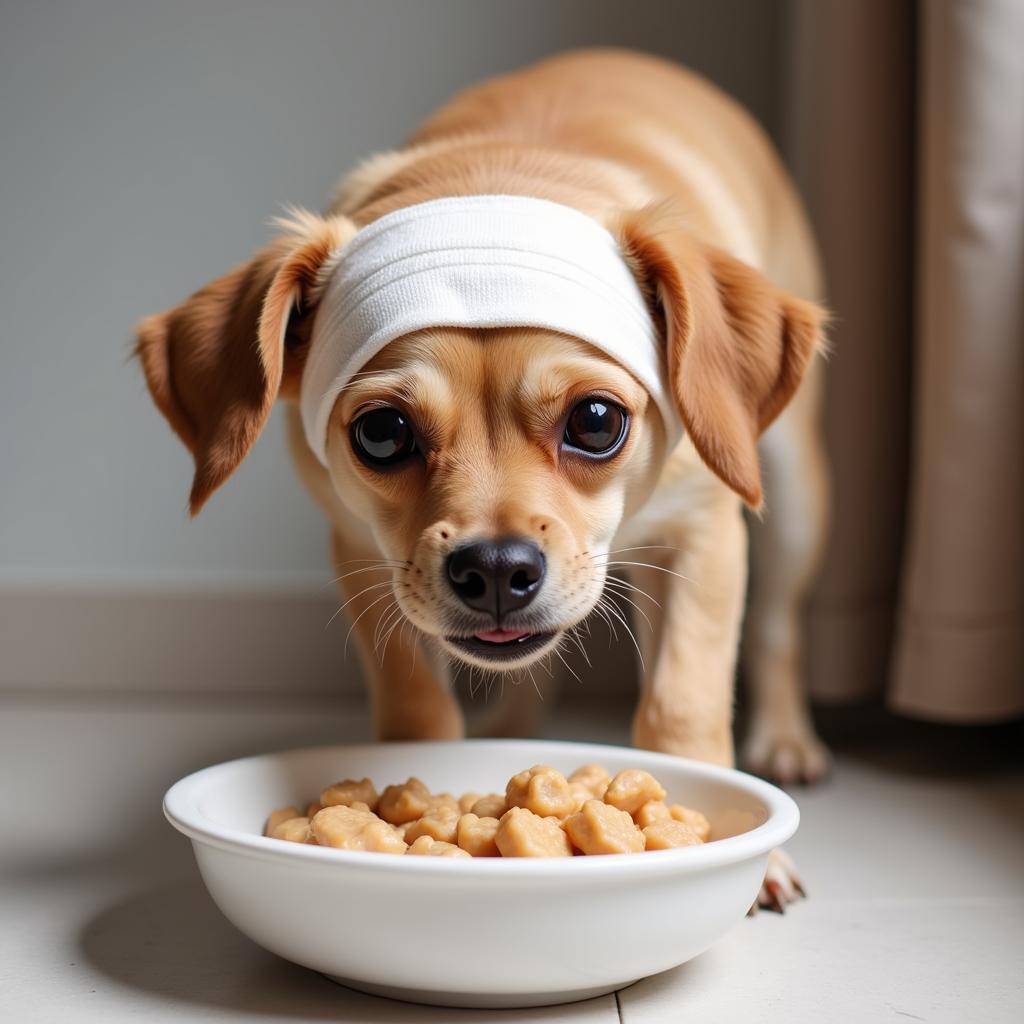Recovering from dental surgery can be ruff for our furry friends. Knowing what soft food to give your dog after dental surgery is crucial for their comfort and healing. This article will guide you through choosing the best soft food options, preparing easy-to-eat meals, and ensuring your dog’s recovery is as smooth as possible.
 A dog enjoying a bowl of soft food after dental surgery
A dog enjoying a bowl of soft food after dental surgery
After your dog undergoes dental surgery, they’ll need a special diet to help them heal. This usually means switching to Soft Food For Dogs After Dental Surgery for a period of time, allowing their gums and mouth to recover. But what exactly qualifies as “soft food,” and how can you make mealtimes easier for your recovering pup? Let’s dive in.
Choosing the Right Soft Food After Dental Surgery
Selecting the appropriate soft food for dogs after dental surgery is essential. Avoid dry kibble and hard treats as they can irritate the surgical site and cause pain. Look for options that are easy to chew and swallow.
Wet Food Options
Canned wet food is an excellent choice. Look for pate-style or similar consistencies that require minimal chewing. You can also add warm water to further soften the food if needed.
Homemade Soft Food Recipes
If you prefer a homemade approach, you can blend cooked chicken, sweet potato, or pumpkin into a smooth puree. Ensure all ingredients are cooked thoroughly and boneless. A tube of dog food can be a convenient way to administer homemade or commercial soft food directly into your dog’s mouth, especially in the initial days after surgery.
Other Suitable Options
Other soft food options for dogs after dental surgery include scrambled eggs, plain cooked rice, and well-cooked pasta. Always check with your vet before introducing new foods to your dog’s diet, especially after surgery.
(https://minacones.com/food-syringe-for-dogs/). The syringe is positioned near the dog’s mouth, and a small amount of food is being dispensed. The dog appears calm and accepting of the feeding method.]
Making Mealtimes Easier for Your Recovering Pup
Besides selecting the right food, making mealtimes as comfortable as possible is important. Here are a few tips:
- Smaller, More Frequent Meals: Offer smaller portions more frequently throughout the day to reduce strain on their mouth.
- Room Temperature Food: Avoid serving food too hot or cold as this can irritate sensitive gums.
- Elevated Food Bowls: Consider using elevated food bowls to make it easier for your dog to eat without bending down.
- Patience and Encouragement: Be patient and encouraging during mealtimes, especially if your dog is hesitant to eat.
How Long Should I Feed My Dog Soft Food?
Typically, dogs need soft food for dogs after dental surgery for about two to four weeks. However, your veterinarian will provide specific recommendations based on the procedure and your dog’s individual needs. Do not reintroduce hard food until your vet gives you the all-clear.
Expert Insight
Dr. Emily Carter, DVM, a renowned veterinary dentist, advises, “Transitioning back to regular food should be gradual. Start by mixing small amounts of kibble with the soft food and gradually increase the proportion of kibble over several days.”
Conclusion
Providing soft food for dogs after dental surgery is vital for their recovery. By choosing appropriate food options and making mealtimes comfortable, you can help your furry friend heal quickly and comfortably. Always follow your veterinarian’s advice regarding post-surgical care and dietary restrictions. Remember, a little extra care and attention can go a long way in ensuring your dog’s happy and healthy recovery.
FAQs
- Can I give my dog ice cubes after dental surgery? Yes, ice chips can help soothe sore gums.
- What should I avoid feeding my dog after dental surgery? Avoid hard kibble, treats, bones, and toys that can irritate the surgical site.
- When can I resume brushing my dog’s teeth? Consult your veterinarian, but usually after the surgical site has completely healed (often 2-4 weeks).
- My dog is refusing to eat soft food. What should I do? Try warming the food slightly or adding a small amount of low-sodium broth for flavor. If they continue to refuse, consult your vet.
- Can I give my dog pain medication with food? Some pain medications can be given with food. Follow your vet’s instructions carefully.
- Is it normal for my dog’s gums to bleed slightly after surgery? Some minor bleeding is normal, but excessive bleeding should be reported to your vet immediately.
- What are the signs of infection after dental surgery? Signs of infection include increased swelling, redness, discharge, bad breath, and lethargy. Contact your vet immediately if you notice any of these signs.
For further assistance, please contact us at Phone Number: 02437655121, Email: minacones@gmail.com Or visit our address: 3PGH+8R9, ĐT70A, thôn Trung, Bắc Từ Liêm, Hà Nội, Việt Nam. We have a 24/7 customer service team.